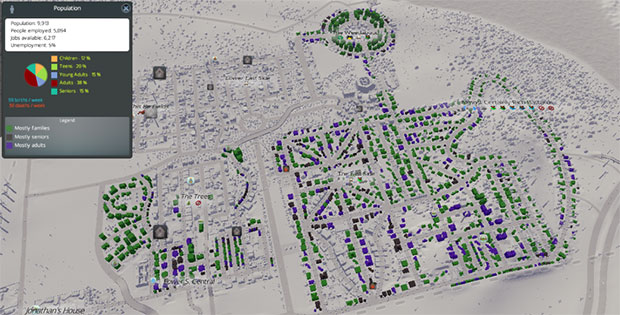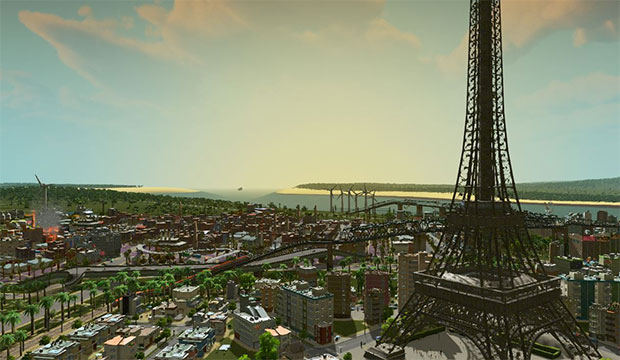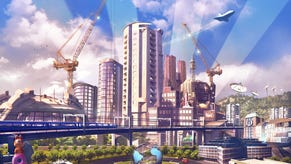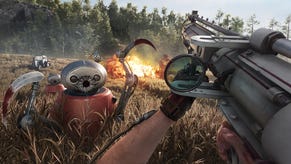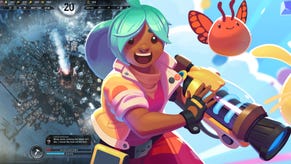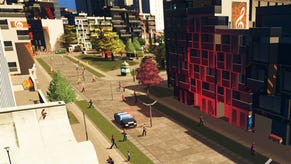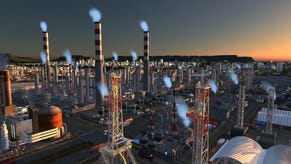A Cities Skylines Succession Diary Part 3 - Firefighting
Co-op chaos
The penultimate part of a series in which three players take it in turns to manage and build up one Cities: Skylines settlement, passing the savefile onto the next person whenever the city levels up. Joining me in this endeavour are Jonathan Shipley and Dan Corns.
This time: roads, garbage truck gridlock, smell refutation and New New Dansville.
DAY 7: Road War
Jonathan: I suspect the way people play Cities: Skylines says a lot about their characters. It’s clear that thus far the three of us have played the game quite differently; Alec has played fuelled by the twin goals of mischief and aesthetics, concentrating largely on ridiculing Dan and planting nice things. Dan, in turn, is all about expansion – starting new areas, zoning, planning for railways we may never let him build. Thus far, as Dan has noted, I’m tending towards introversion and micro-management. And mass-slaughter, but that was just the once.
I put out an appeal in one of my earlier posts to see if anyone could help me sort the traffic flow, and following helpful comments from James and Gap Gen I decided to spend my time trying to free our citizens from the appalling infrastructure which, frankly, had been my toxic gift to them since I laid some completely illogical roads in the very first turn. That meant lots of trial and error, lots of tearing my hair out, and lots of fun destroying roads and leaving cars suspended momentarily on the landscape like disorientated ants.
In brief, I’m pretty sure that there’s nothing resembling a traffic bug in this game. It works beautifully – if you take the time to really troubleshoot your planning. There are no simple answers; intersections slow traffic down, yes, but so long as people are getting in the right lanes (which they will if they’re given enough route options) the problems they cause are minor. One way roads make tremendous sense. Highways are perfect for getting industrial traffic in and out of a city. And roundabouts are a dream, so long as you’re careful to ensure they’re one-way and you get traffic off the road before you allow traffic back on (the principle I followed was, clockwise, exit-exit-entrance-entrance).
If you have a snarl-up, simply slow the game down and watch what the cars are doing. When do they get into lane? Where are they going? Are all the lanes being used? Do they have alternative routes? Playing with this aspect of the game is not the most entertaining from a storytelling point of view, but it’s tremendously satisfying when you get it right.
Traffic addressed (I didn’t say perfected), I turned my attention to the other problems in the city. Alec’s decision to cripple Dansville with legalised drugs and turn it into The Weedabout meant that when I checked in it was swamped with crime. I decided I either needed to build a big police station, or exacerbate the problem by upgrading the housing to high-rise and encourage the place to turn into a ghetto. Yup, I chose the latter. I also turned on a lot of the policies and noted with interest that the initial investment of providing recycling, fire alarms, tax breaks etc swiftly plunges you into the red, but only temporarily – implementing high-tech housing, in particular, is a great way to raise land value, level up housing and expand population. All of which is testament, I think, to the fact that The Room is slowly, slowly, beginning to resemble a working city. For now. Next things that needed addressing – fairly urgently – were rubbish and water pollution.
DAY 8 - New New Dansville
Dan: I’d like to start by saying I didn’t recognise (or perhaps notice) the problems which Alec pointed out in his last entry. Also I don’t smell.
I inherited a city whereby trains had become a reality and having battled to keep some gaps between parts of the city for this purpose I set about on my scheme to build a fully integrated transport network.
I think I built four suburban railway stations as well as a freight station in the main industrial area. The freight train worked right away, but it wasn’t until the end of my go that I noticed that some of the tracks leading to my stations were not properly connected.
I’ve had this issue a few times in this game. I often find myself having to compromise on the elegant road or rail formations I see in my head because the game simply won’t bend the rail or roads to my will. At this point I will confess to knocking down a few on Alec’s smooth Highway intersections as they got in the way of my rail dreams. I wasn’t able to put them back again in the same way afterwards.
Having had my to-be-executive estate trashed and forcibly renamed ‘The Weedabout’ I set about constructing a second ‘New Dansville’ to its north. This is even more executive, and I spent a large amount of the money Alec raised in furnishing it with lots of amenities.
I also built the Eiffel Tower as an excellent addition to one of my earlier estates.
DAY 9 - Regulators
Alec: I went in determined not to be mean to anyone this time, but my resolve was sorely tested as soon as I began to dig into the finer detail of the superficially thriving city I'd inherited. Most immediately, I noticed that a large section of New New Dansville was entirely without water due to an absence of pipes - something Dan dismissed as 'details' when I enquired about how this could happen to his executive-intended pride and joy.
For quite some time I left its people to dehydrate and stew in their own filth, reasoning that New New Dansville becoming the most squalid part of town was the punishment Dan deserved for his slapdashery, but my need for order could only deal with the increasingly angry warning icons above it for so long. Grudgingly, I built a pipe, then in a fit of pique renamed the district New Dansmellsville.
The next second-hand mess to clear up was a new landfill site built just metres away from our main residential area. Dan argued that building a line of trees in front of it meant it wouldn't affect land value, but hadn't noticed that blocks upon block of the area was now log-jammed with dozens of garbage trucks. Jonathan's plans for a neat road structure had been undone by the city's sudden reliance on this one foetid cul-de-sac for all its refuse purposes.
Undoing this damage was a nightmare - you can't get rid of a landfill until it's emptied out into another, but this takes a very long time even when most of your other landfills aren't close to overflowing themselves (which was why Dan had built this new refuse site). In the end I took out a sizeable loan to buy two incinerator plants, which I placed just behind the foetid cul-de-sac, hoping this would expedite clearing them out and we could then spare our residents from the persistent stench of rotting teabags on the morning breeze. Sadly the two dumps were still 40% full by the time my tenure ended; I can but pray one of the others picks up my stinking baton. Missus.
I'd had grand plans to build a hydro-electric dam and more super-structures, but instead got bogged down in healing up other wounds of expansion. There were precious few schools, leading to a worker shortage. There were bodies piling up - even in office blocks - because our cemeteries were overflowing with the dead, and too far flung for hearses to arrive quickly. Our lumber and farming-centric Industry wasn't working out. One of our stations wasn't actually connected to any rail track. There were hardly any parks of playgrounds. Huge rounds had no sound dampening, causing minor land values crises. We were spending a fortune on buses, for some reason.
I don't think anyone in particular was to blame for most of this - we were simply paying the cost of becoming a big city, at which point the game switches away from designer's sandbox and into low-key firefighting. In time it would settle, but for now I had to comb the streets with a microscope.
This meant that, bar zoning out and building transport to a new office district in order to take advantage of the more educated workers coming out of our brand new university (my one major expense this turn), I didn't make many visible changes to the city. I was the fixer, a waterpipe-obsessed Mr Wolf to Jonathan and Dan's Jules and Vincent. I tinkered and tweaked and hopefully made everything a little better and a little more efficient and, thanks to strategic crematorium placement, a whole lot less corpsey. All this brought a steady increase in land value and a steady flow of new citizens, triggering an upgrade to an 18,000-strong Grand City long before I felt my work was completed. As a result, the city was now pulling in almost $6000 a day, up from some $1000 when I took over. What new follies would my colleagues squander this on in our next and final instalment? Ooh, drama.



